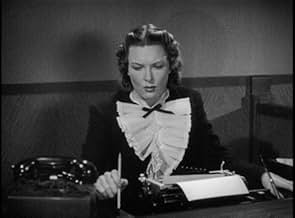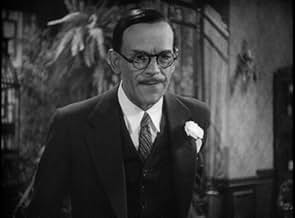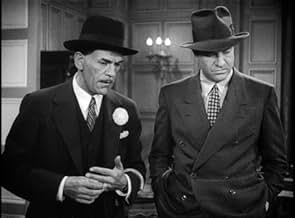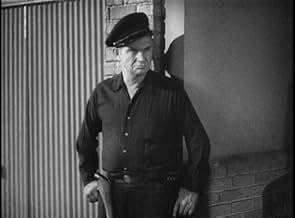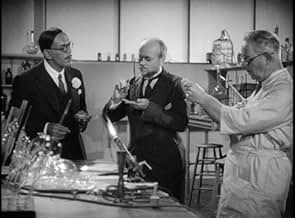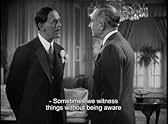NOTE IMDb
5,9/10
1,4 k
MA NOTE
Ajouter une intrigue dans votre langueSan Francisco Detective Wong is contacted by Dayton, who fears for his life. When Wong arrives at Dayton Chemical Co. the next day, he finds him dead.San Francisco Detective Wong is contacted by Dayton, who fears for his life. When Wong arrives at Dayton Chemical Co. the next day, he finds him dead.San Francisco Detective Wong is contacted by Dayton, who fears for his life. When Wong arrives at Dayton Chemical Co. the next day, he finds him dead.
- Réalisation
- Scénario
- Casting principal
- Récompenses
- 1 nomination au total
John St. Polis
- Roemer
- (as John St.Polis)
Frank Bruno
- Lescardi
- (non crédité)
Ed Cassidy
- Ambulance Doctor
- (non crédité)
Wheaton Chambers
- Chemistry Lab Director
- (non crédité)
Clancy Cooper
- Warehouse Man
- (non crédité)
Avis à la une
Throughout the 1930s, Fox Studios made a ton of very successful Charlie Chan films. It isn't surprising that this led to knock-off characters like Mr. Moto (also from Fox) and Mr. Wong (from poverty row giant, Monogram Studios). Frankly, while the Moto and Wong films are pleasant enough B-movies, they are too similar to the Chan films but lack their charm and wit. In the case of Wong and Chan the similarity was even greater as both were of Chinese descent, traveled the world and were "do-gooders" who often helped the helpless when conventional police work failed.
In the early 1940s after Monogram completed six not particularly distinguished films AND Fox decided to discontinue the Chan series, an opportunity arose for Monogram to bring Sidney Toler to the studio and make their own Chan films. As a result, Wong was expendable and since four years had passed since the last film in this series, the studio heads decided they wanted no more Wongs. Besides, if they had Chan AND Wong, the resulting films would be like having two Wongs--and that's just not right.
MR. WONG, DETECTIVE is the first Wong film and there's nothing particularly wong, I mean WRONG about the film. It was entertaining and had a nice mystery. However, it's also an awful lot like several other Monogram films--and is most like their next Wong film, THE MYSTERY OF MR. WONG. It's also a lot like the Chan films, MURDER OVER NEW YORK, THE JADE MASK and DOCKS OF NEW ORLEANS. In other words, many plot elements were repeated and after a while the films started to be indistinguishable from each other--something that was NOT a problem with the Fox films.
Overall, it's worth seeing and is possibly the best film of the series--though this isn't saying a lot.
In the early 1940s after Monogram completed six not particularly distinguished films AND Fox decided to discontinue the Chan series, an opportunity arose for Monogram to bring Sidney Toler to the studio and make their own Chan films. As a result, Wong was expendable and since four years had passed since the last film in this series, the studio heads decided they wanted no more Wongs. Besides, if they had Chan AND Wong, the resulting films would be like having two Wongs--and that's just not right.
MR. WONG, DETECTIVE is the first Wong film and there's nothing particularly wong, I mean WRONG about the film. It was entertaining and had a nice mystery. However, it's also an awful lot like several other Monogram films--and is most like their next Wong film, THE MYSTERY OF MR. WONG. It's also a lot like the Chan films, MURDER OVER NEW YORK, THE JADE MASK and DOCKS OF NEW ORLEANS. In other words, many plot elements were repeated and after a while the films started to be indistinguishable from each other--something that was NOT a problem with the Fox films.
Overall, it's worth seeing and is possibly the best film of the series--though this isn't saying a lot.
With one more picture to go on his Warners contract (the result "British Intelligence"), and seemingly no end in sight for Hollywood's infamous, self imposed horror ban, Boris Karloff was quick to sign on the dotted line with Poverty Row studio Monogram to begin a six picture stint as an Oriental crime solver in 1938's "Mr. Wong, Detective," which began Aug. 24 for October release, mere weeks after completing the Warners drama "Devil's Island." The actor was well known for portraying ethnic villains during the silent days, first attempting a Chinese character in 1932's "The Miracle Man," then starring as Wu Yen Fang in Warners' 1937 "West of Shanghai," so in the wake of Warner Oland's Charlie Chan and Peter Lorre's Mr. Moto, becoming the third Asian sleuth of the decade held much appeal for him, a heroic character under heavy makeup and hairpiece but no accent. By sheer coincidence, he was already a veteran of not one but two previous Chan titles, his talkie debut in 1929's "Behind That Curtain," in which his role as a Sudanese servant was actually larger than Chan himself (E. L. Park reduced to a cameo in his only screen appearance), and 1936's far better known "Charlie Chan at the Opera," which advertised 'Warner Oland vs. Boris Karloff' despite the stars sharing only a single scene together. The character was created by Hugh Wiley as a more genteel and well spoken response to Earl Derr Biggers' creation, his respectful manner, love of tea, and (unlike the pidgin English adopted for "West of Shanghai") eloquent speech revealing an Oxford education, all make him perfectly suited for the British actor. San Francisco provides the setting for the series, Wong initially retained by chemical manufacturer Simon Dayton (John Hamilton), who fears for his life after several mysterious 'accidents,' including the deliberate impersonation of his chauffeur in a failed kidnapping attempt. Wong shows up for his 10AM appointment at Dayton's office only to discover him already dead, shortly after being threatened by Carl Roemer (John St. Polis) for stealing the latter's formula for poison gas, along with both partners, Christian Wilk (Hooper Atchley) and Theodore Meisle (William Gould). Tiny pieces of broken glass put the bloodhound on the scent, revealing that odorless, colorless poison gas was released from inside the sphere when its brittle shell shattered from high pitched sound, such as the screech of a parrot. Suspects Wilk and Meisle, equal partners to inherit Dayton's shares, soon suffer the same fate, even when Wong is present in the next room while Wilk perishes behind the door of his locked study. Not to be overlooked are a trio of foreign spies seeking to stop the shipment of chemical weapons overseas to hurt their respective countries, it was they who sought to kidnap Dayton without success. Grant Withers sports the first name Sam in these first two entries, girlfriend Myra (Maxine Jennings) conveniently working as Dayton's secretary, never seen again in the series (Lee Tong Foo as Wong's manservant would return on three occasions). The identity of the culprit isn't half so puzzling as to how it's carried off, good enough for Monogram to warrant a remake 10 years later for Roland Winters' second Charlie Chan vehicle, "Docks of New Orleans," more threadbare yet still diverting. The second Wong entry would only begin after Karloff's triumphant return to horror in Universal's "Son of Frankenstein."
Having been a fan of Charlie Chan I was not familiar with Mr Wong but to my surprise the story itself was worthy of a Charlie Chan. Over look Boris Karloff as an oriental will allow you to enjoy this film. Film opens fast with a frighten man seeking help from Mr Wong. His murder is a mind bender in the tradition of Chan films as no one can figure out how a man in a locked room is killed with the police right outside of the door. Many suspects and more of the mysterious murders makes this a film "most enjoyable" for the "detective" in each of us.
Although most of the production is pretty plain, the basic mystery story in "Mr. Wong, Detective" is rather interesting, and Boris Karloff's good performance as the detective also makes it worth seeing. Karloff brought a human touch to every role that he played, and even though this is an atypical part for him, he is a believable Mr. Wong. Most of the other characters are somewhat nondescript, except for Grant Withers's abrasive police officer, and aside from Karloff the cast is nothing special, but the story itself is enough to hold your interest.
In the story, the detective must patiently solve a mystery from the slightest of clues. Some of the developments strain credibility, but if you can accept the premise, it's an interesting idea and it makes decent use of the details. There are several places where it could have been written better or edited more effectively, but the pacing is pretty good, and as it proceeds, it often gives you what you need to know in order to try to anticipate what happens next.
The climactic sequence is one of the better ones that you'll see in this kind of B-movie. The production values are lower than a Karloff feature deserves, but with a solid story and Karloff in the lead, it's definitely worth seeing.
In the story, the detective must patiently solve a mystery from the slightest of clues. Some of the developments strain credibility, but if you can accept the premise, it's an interesting idea and it makes decent use of the details. There are several places where it could have been written better or edited more effectively, but the pacing is pretty good, and as it proceeds, it often gives you what you need to know in order to try to anticipate what happens next.
The climactic sequence is one of the better ones that you'll see in this kind of B-movie. The production values are lower than a Karloff feature deserves, but with a solid story and Karloff in the lead, it's definitely worth seeing.
In the great tradition of Chinese detectives as Charlie Chan and Mr. Moto, Boris Karloff's Mr. Wong was a solid addition to that venerable kind of films. Is really difficult to think in Karloff as a Chinese person, but the British actor delivers a solid performance, if you can dig his weird accent. The plot is simple, the strange murders are against logic, but Mr. Wong's patience and intelligence can solve the mystery. The other actors are far below Karloff, but the overall fell of the movie is candid and likable. Another completely different Mr. Wong was played before by Bela Lugosi, a villain, but this detective deserves your interest if you are a fan of the genre.
Le saviez-vous
- AnecdotesAs an example of just how low the budget of this film was, when a note is delivered to Mr. Wong's front door, the actor playing the messenger has no dialogue. If the actor had spoken even one word, SAG rules would have required Monogram Pictures to pay him an additional $10!
- GaffesShortly before Mr Wilk is killed, he is in his study awaiting the arrival of the police. He goes to the window and looks out. There is not a sphere on the table by the window.
When the police arrive and find Wilk on the floor dead, Mr. Wong goes to the table by the window and finds the residue of the gas filled sphere in what would have been plain sight.
- ConnexionsFeatured in Film Breaks: Detectives from the Orient (1999)
Meilleurs choix
Connectez-vous pour évaluer et suivre la liste de favoris afin de recevoir des recommandations personnalisées
- How long is Mr. Wong, Detective?Alimenté par Alexa
Détails
- Durée1 heure 9 minutes
- Couleur
- Rapport de forme
- 1.37 : 1
Contribuer à cette page
Suggérer une modification ou ajouter du contenu manquant

Lacune principale
By what name was Mr. Wong, Detective (1938) officially released in India in English?
Répondre

